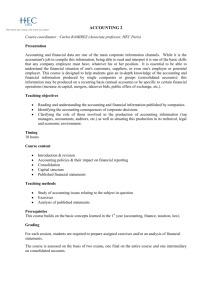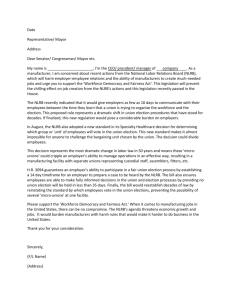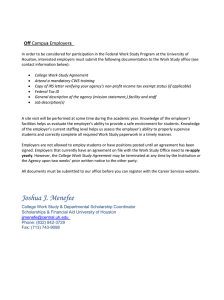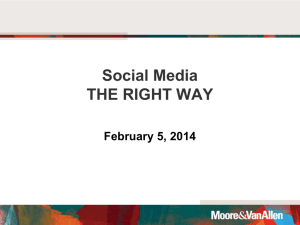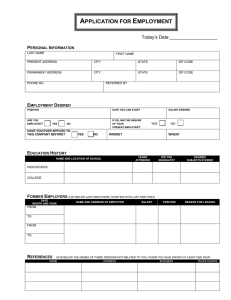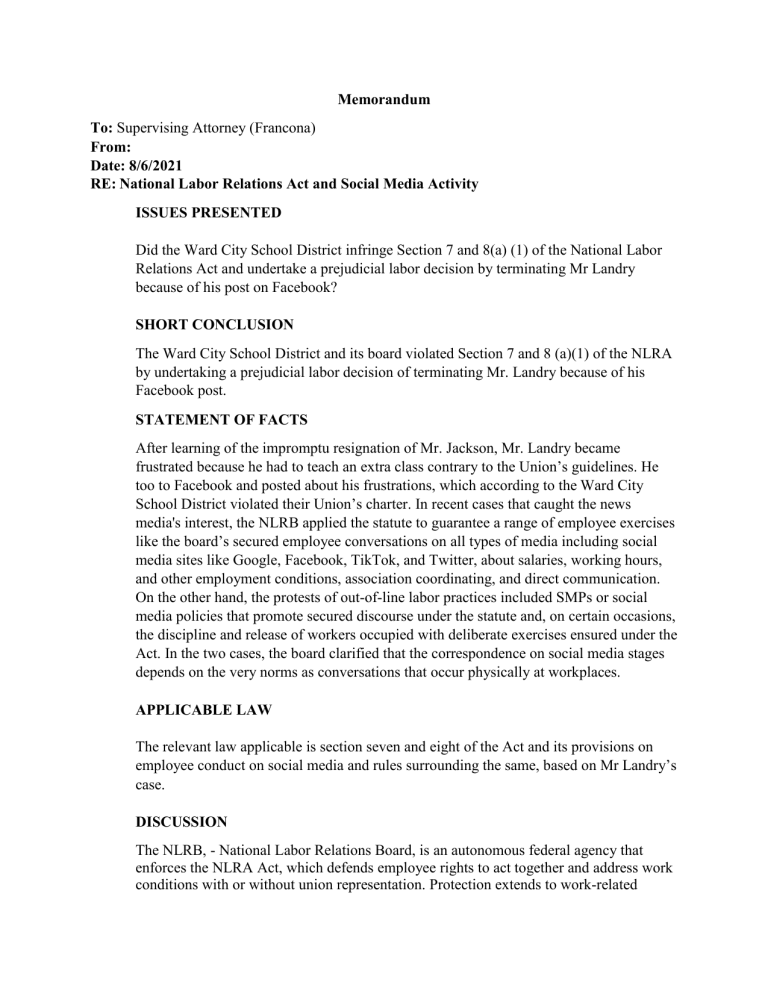
Memorandum To: Supervising Attorney (Francona) From: Date: 8/6/2021 RE: National Labor Relations Act and Social Media Activity ISSUES PRESENTED Did the Ward City School District infringe Section 7 and 8(a) (1) of the National Labor Relations Act and undertake a prejudicial labor decision by terminating Mr Landry because of his post on Facebook? SHORT CONCLUSION The Ward City School District and its board violated Section 7 and 8 (a)(1) of the NLRA by undertaking a prejudicial labor decision of terminating Mr. Landry because of his Facebook post. STATEMENT OF FACTS After learning of the impromptu resignation of Mr. Jackson, Mr. Landry became frustrated because he had to teach an extra class contrary to the Union’s guidelines. He too to Facebook and posted about his frustrations, which according to the Ward City School District violated their Union’s charter. In recent cases that caught the news media's interest, the NLRB applied the statute to guarantee a range of employee exercises like the board’s secured employee conversations on all types of media including social media sites like Google, Facebook, TikTok, and Twitter, about salaries, working hours, and other employment conditions, association coordinating, and direct communication. On the other hand, the protests of out-of-line labor practices included SMPs or social media policies that promote secured discourse under the statute and, on certain occasions, the discipline and release of workers occupied with deliberate exercises ensured under the Act. In the two cases, the board clarified that the correspondence on social media stages depends on the very norms as conversations that occur physically at workplaces. APPLICABLE LAW The relevant law applicable is section seven and eight of the Act and its provisions on employee conduct on social media and rules surrounding the same, based on Mr Landry’s case. DISCUSSION The NLRB, - National Labor Relations Board, is an autonomous federal agency that enforces the NLRA Act, which defends employee rights to act together and address work conditions with or without union representation. Protection extends to work-related discussions conducted on social media.1 Inspite of the transparency of such cases, an astonishing total of supervisors remain uninformed regarding the Act’s insurance of work-related grievances that affect non-association employees within the education sector. Such an oversight is capable of trapping any person/entity/institution in an excessive and tedious legal battle that would normally have been handily kept away if directors had a comprehensive and extraordinary experience with employment and labor law rules. The NLRB responds to off-labor works on identifying with the violation of employees' section seven rights by expecting an employer to handle improper discipline or release activities through the restoration of workers to their previous position as they would have been with full back pay, as well as damages for any times of suspension or release. Besides, the board also expects proprietors to post notifications of members’ rights under the Act and explain that the employer does not wish to submit unmerited labor rehearses later on. Concerning overbroad policies and related employer policies, the board expects amendments to fit inside the provisions of the Act.2 The board necessitates that notification is displayed illustrating worker rights under the Act; such information that expresses the employer's policy is reviewed to remedy pain points and that the employer will not submit unreasonable labor repeats later on. If employers contact employees via email, the board requires such notification to be shipped off the employees' email. To comprehend the board’s oversight of employer policies, one requirement to investigate the developing number of its choices, it’s rundown reports in regards to social media issues deliberated by the its division of advice (DOA), just as warning assessments from the DOA that fill in as direction to provincial workplaces on the branch of knowledge of obstruction with secured operation on online media. Such reports, choices, and memos articulate the sorts of online media, privacy, and other prohibitive procedures violate the Act ensured deliberate exercises. Moreover, they stress the board's eagerness to revise employer policies on social media that violate ensured worker discourse, in any event, when employers do not authorize such policies. The main ten cases will be considered in sequential request, featuring the central points of interest and significant rules for upcoming direction to institutions and their employees.3 Although the board is at present confronting legal difficulties to its abilities in authorizing the Act, it together with its AGC or acting general counsel keep up with that employers should maintain the policies of the Act and revise policies and different guidelines under section seven exercises, as communication on online media.4 Within the main similar case, the board gave an objection against an employer, for the suspension and termination of a negative worker remarks concerning her administrator on her page on Facebook. Federal offices affirmed that employers defended the fired worker 1 "The NLRB And Social Media | National Labor Relations Board". 2021. Nlrb.Gov. https://www.nlrb.gov/aboutnlrb/rights-we-protect/your-rights/the-nlrb-and-social-media. 2 Steven Greenhouse, Even if it Enrages the Boss, Social Net Speech is Protected, N.Y. TIMES, Jan. 21, 2013, http://www.nytimes.com/2013/01/22/technology/employers -social-media-policies-come-under-regulatoryscrutiny.html (quoting NLRB Chairman Mark G. Pearce that “[m]any view social media as the new water cooler”). 3 O'Brien, C. N. (2013). The top ten NLRB cases on Facebook firings and employer social media policies. Or. L. Rev., 92, 337. 4 Section 7 of the National Labor Relations Act for her Facebook posts and for mentioning her association delegate in an investigatory meeting that prompted discipline. In particular, the Labor Board kept up with that the employer's instructions on publishing content to a blog and online posting that includes social media usage, guidelines of direct identifying with examining collaborators and bosses, and requesting and appropriation, were overbroad, meddling with employees' all in all correct to participate in joint exercises for shared guide and insurance under chapter seven of the Act. The board, as the federal office that authorizes the legal privileges of all workers protected by the Act—not simply the individuals who have a place with associations—flagged that it is prepared to indict organizations with policies that unduly meddle with worker communication about work-related issues like salaries, working hours and working conditions on online social media.5 Thus, the above scenario notifies institutions that guidelines influencing worker communication via media like email and social media during nonworking hours, ought to be looked into to guarantee that they do not violate the Act.6 CONCLUSION While an institution or employer is qualified to have policies concerning internet involvement, the laws ought to be painstakingly created to allow workers to examine section seven. Online social media is currently an additional for communication. The internet is where workers accumulate for peer conversations concerning employment agreements. Employers are very much educated to diagram what types regarding on the web interchanges harm the organization and, subsequently, what direction will bring about discipline and release, while clarifying that employees might, in any case, take part in ensured purposeful exercises. Except disturbing wrongdoing, employees ought to participate in purposeful exercises individually if at work and indeed on their PCs or compact gadgets. An online social media and communication policy ought to illustrate that there is no goal to meddle with worker rights under section seven and illuminate the implication that workers are allowed to examine salaries, working hours, and conditions just as an issue of shared guide or security individually and during a non-working time like breaks and lunch inside set up working hours. Considering the current creation of the board, employers should revise their policies, so where workers are permitted to utilize organization hardware to convey social media for nonworking related communications, are likewise ready to use something very similar for purposeful exercises on free hours without a balancing genuine professional reason of the employer, as this might a future policy. 5 Myers, C. (2014). The new water cooler: Implications for practitioners concerning the NLRB's stance on social media and workers’ rights. Public Relations Review, 40(3), 547-555. 6 Hemenway, A. (2012). The NLRB and Social Media: Does the NLRB Like Employee Interests. J. Corp. L., 38, 607.

